Editor: In honor of Women’s History Month, we are featuring interviews with local women leaders. These pieces were written by Baylor University students from the Department of Journalism, Public Relations, and New Media.
By Emma Porter
Anna Futral, executive director of CASA McLennan County, came to Waco in 2004 as a Baylor University student. Sixteen years later, she still lives in Waco, now alongside her husband and three children. Initially, business kept Futral in town, however she said it didn’t take long for her and her husband to call Waco home.
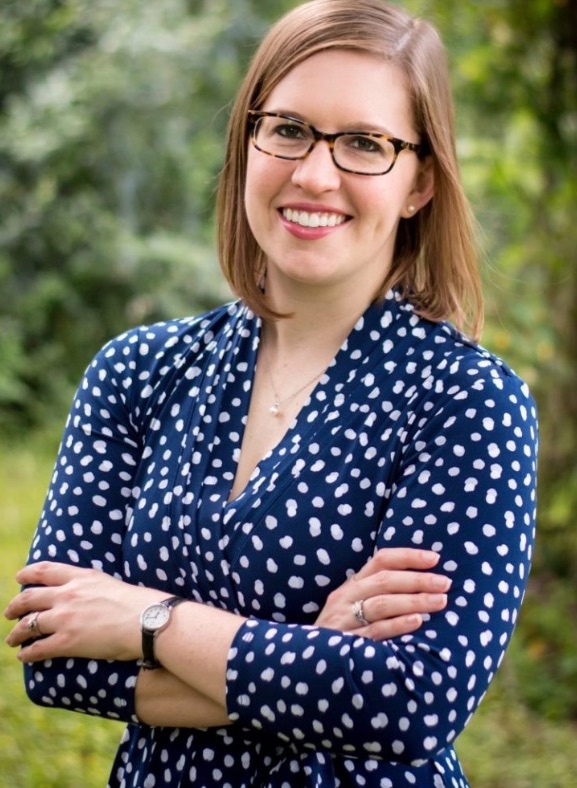
“We liked it a lot, and we really chose to just dive into Waco and build our life here,” Futral said.
As fresh college graduates and newlyweds, Futral and her husband found exploring Waco to be one of their favorite activities. In college, the couple worked with Habitat for Humanity, which Futral said prompted them to see Waco in a broader light than most students.
From hiking in Cameron Park to eating at mom-and-pop shops, and even working with nonprofits, the Futrals did not hesitate to become a part of the community.
“I go across the river to Lula Janes a whole lot more than I should. It’s too good,” Futral said.
Futral mentioned several local spots she loves to eat at, including Lula Janes, Helados La Azteca, Baked Bliss, and a number of taquerias. She said not only is the food amazing, but they also love to support local businesses, especially during the pandemic.
When the Futrals adopted their children in 2015, they knew they wanted their kids to be immersed in their community. The Futral kids love the Mayborn Museum, the Cameron Park Zoo, and hiking with their parents at Cameron Park.
“Waco has a wonderful entertainment and education scene for children,” Futral said.
Like many, the Futral family loves to visit Magnolia Market. The company has brought more business and tourism to Waco, but Futral said one of the best parts is that the Magnolia Foundation has donated to many local organizations, including CASA.
As a female leader in Waco and a Baylor alumna, Futral said she has seen great strides in the city’s economy over her 16 years, however there is still much to be done.
“There are so many folks that genuinely love Waco, and I would encourage them to remember that there are individuals in Waco, members of our own community, that are hurting in some way,” Futral said. “Whether that’s folks experiencing homelessness, children in foster care, or low-income families, we need to consider that there is more to Waco than the business scene or tourist and outdoor parks scene. Those things are all wonderful, but remember that at the heart of our city there are still a lot of folks that need you to tune into their situation and remember that they’re there.”
Futral has worked for CASA for five years. CASA is a nationwide nonprofit that recruits, supports, and trains volunteers who advocate for the safety and best interest of children in foster care.
“We have a really healthy nonprofit scene in Waco. There are groups serving the various populations so there is no lack of ways to get involved,” Futral said.
One way to get involved with the Waco community is through the CASA Christmas store. Each year, Futral said CASA gathers Christmas lists from the 230 children that CASA serves. If someone signs up to be a donor they get matched with a child and given their Christmas list, the donors then have the opportunity to shop and wrap the gifts for their partnered child.

Emma Porter is a freshman journalism major at Baylor University, who fell in love with journalism while writing blog posts about mission work in Guatemala.
The Act Locally Waco blog publishes posts with a connection to these aspirations for Waco. If you are interested in writing for the Act Locally Waco Blog, please email Ferrell Foster at [email protected].
By Madison Schick
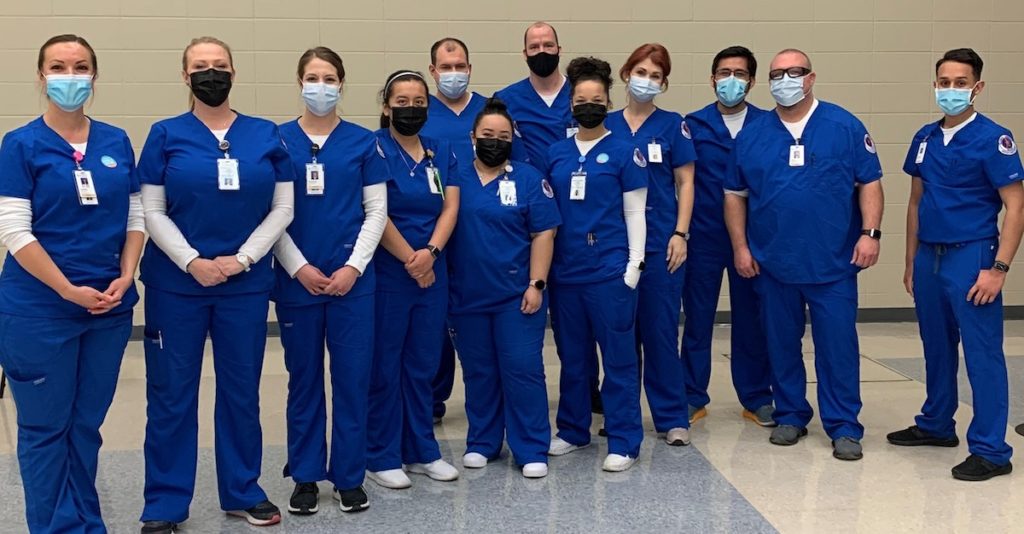
McLennan Community College’s Health Professions students have experienced personal fulfillment through their volunteer efforts at Waco’s COVID-19 vaccination clinics, and they have helped redefine the influences of hands-on education and what it means to learn through experience.
Students of the Associate Degree Nursing, Medical Lab Technician, Medical Assistant, and Veterinary Technology programs participated with MCC faculty and other local medical professionals to educate, care for, and vaccinate members of the community in the fight against COVID-19.
Students’ participation in the vaccination clinics has been eye-opening in community building and in the ability of aspiring health profession students to witness a glimpse of the impactful differences they will continue to make in the future as professionals.
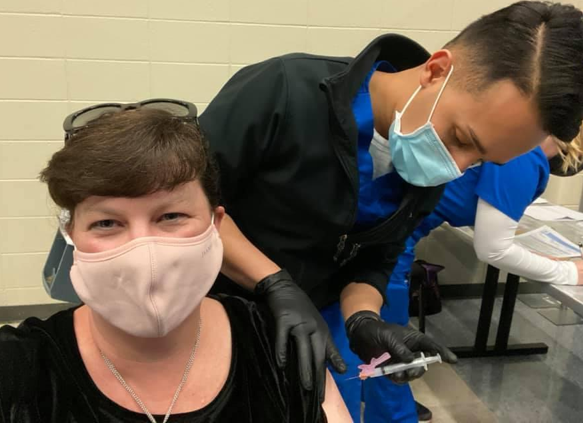
Liz Painter, RN and simulation specialist within MCC’s Vocational Nursing, administered vaccines to survivors of COVID-19, joyfully tearful immunocompromised adults, and at-risk geriatric patients hopeful to see their families in the near future. With pride in MCC and her students, Liz is also grateful to have met “such a range of people, but all so happy to be receiving the vaccine.”
Among the thousands to receive the vaccine, MCC’s Senior Graphic Designer Clif-Ann Paris could not have been more impressed with the efficiency, efficacy, and success of the vaccination clinic. “My appointment was for 12:10 p.m., and I was given my first dose only two minutes later. I was given all the information I needed, and my wellbeing was prioritized.”
What’s next for McLennan Community College? Dean of Health Professions Glynnis Gaines reflects, “We always talk about community service, and it is a part of who we are, but this has really opened new doors” for students and faculty. Nursing students from Baylor University, Texas State University, and Texas Christian University make up only a few of participating institutions across the state that join MCC in education and service through active volunteerism at COVID-19 vaccination clinics across the state.
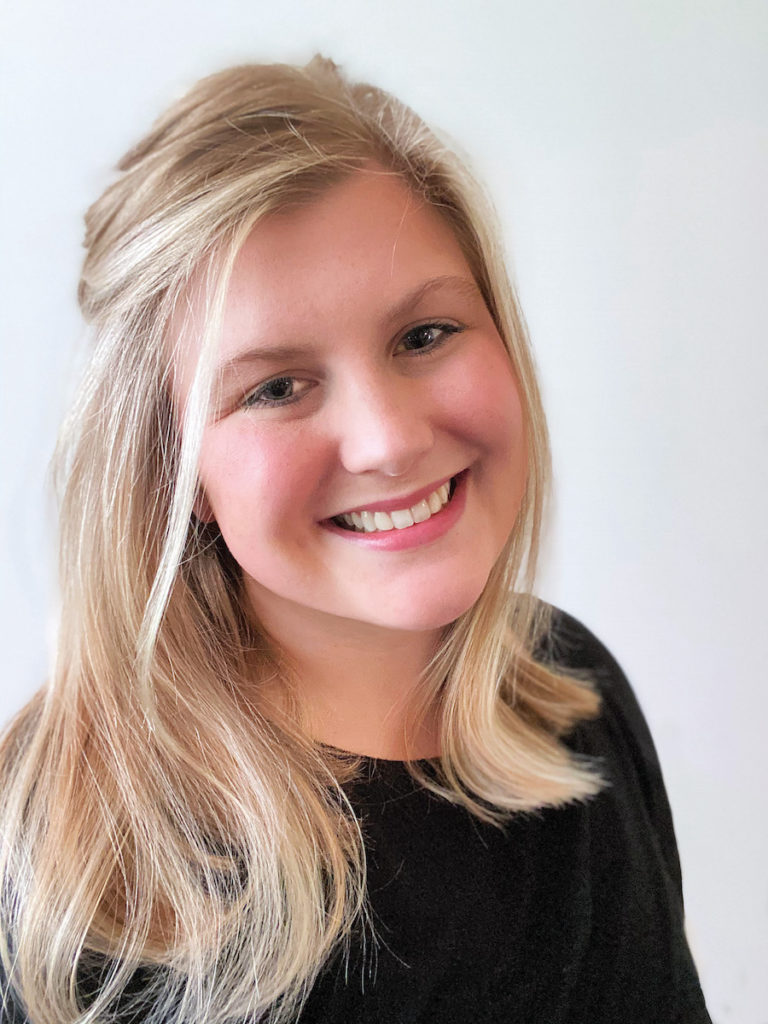
Madison Schick is social media and communications specialist at McLennan Community College. A literature enthusiast and graduate of the University of Texas at San Antonio, Madison studied environmental science, English, and history, and still loves all things related to reading and writing. Her other interests include connecting with old friends, trying new restaurants, and spoiling her two rescue cats, Remus and Chewy, with lots of love and treats.
The Act Locally Waco blog publishes posts with a connection to these aspirations for Waco. If you are interested in writing for the Act Locally Waco Blog, please email Ferrell Foster at [email protected].
By Ashley Bean Thornton
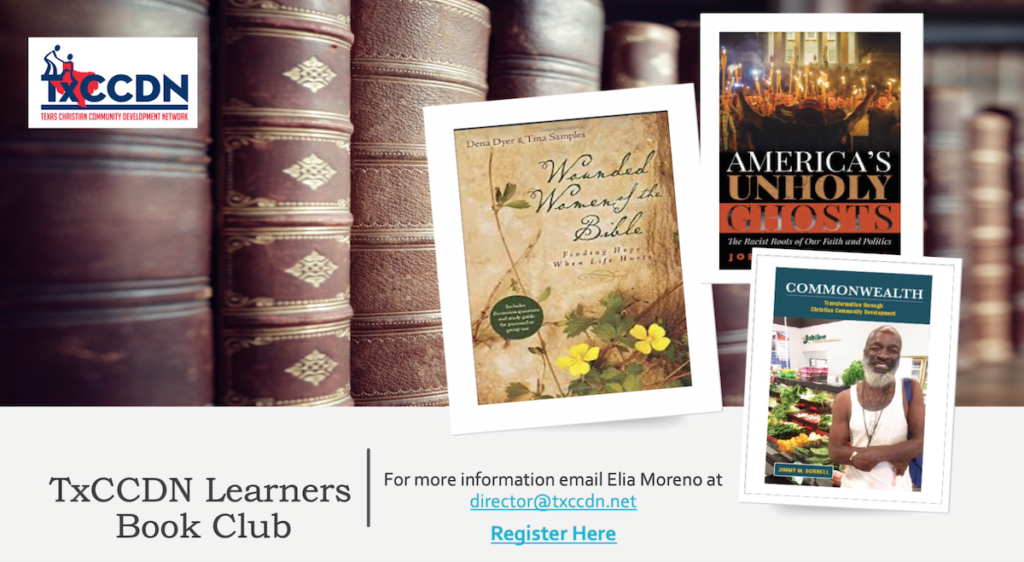
I’m sharing a link to TxCCDN Learners Book Club. The Texas Christian Community Development Network website states: “This book club provides a safe place for the reader to learn and grow on topics such as community development, professional development, racial injustice, poverty, self-growth, and much more. Some of these topics are uncomfortable and at times difficult. Rest assured not one of us knows it all but together we have the opportunity to dialogue and learn from each other.”
Their list of upcoming books may be ones to think about for ALW Book Club.
Here’s the link: https://txccdn.net/event/txccdn-learners-book-club/

Our next meeting will be March 16 and the book is See No Stranger: A Memoir and Manifesto of Revolutionary Love, by Valarie Kaur. Here’s a link to one of her TED talks https://valariekaur.com/ted/.
We’ll send out meeting details as we get closer.
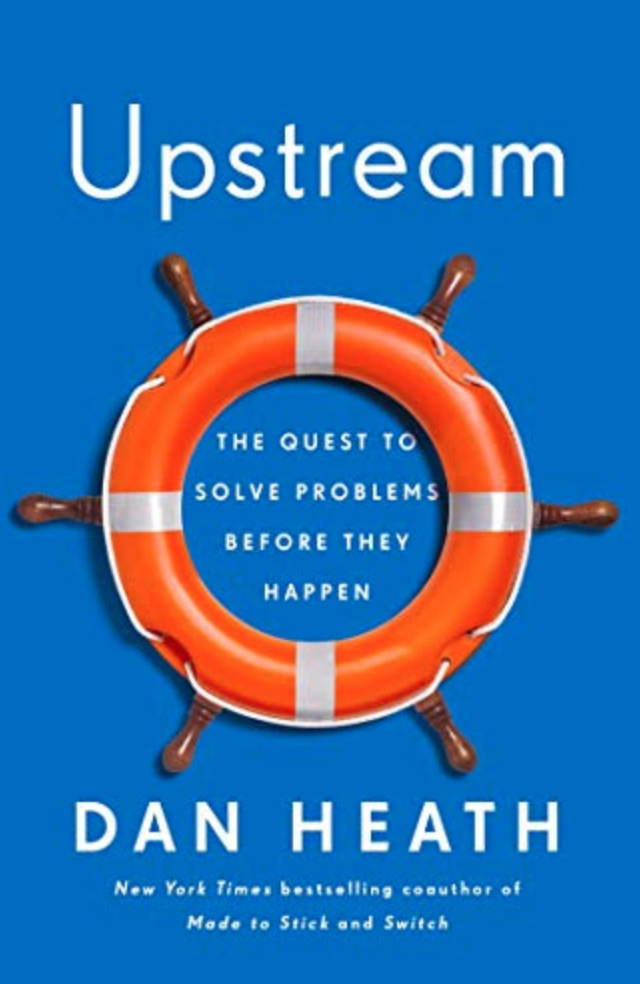
The May 11 book will be Upstream: The Quest to Solve Problems Before They Happen, by Dan Heath (rain delay, May 25, if needed)
We will take off June, July, and August.
Stay safe and if you have comments or thoughts, please don’t hesitate. Email me!
Do you have friends who want to join our book club? Sign up to be on the mailing list here.
Editor: In honor of Women’s History Month, we are featuring interviews with local women leaders. These pieces were written by Baylor University students from the Department of Journalism, Public Relations, and New Media.
By Gabby Sherwood
When attorney Angela Tekell was offered jobs in Austin and Houston, Tekell said it didn’t take her long to realize her family had a good life in Waco and that it felt like home. Tekell said being involved in the community and spending her free time riding her bicycle has made her time in Waco fulfilling.
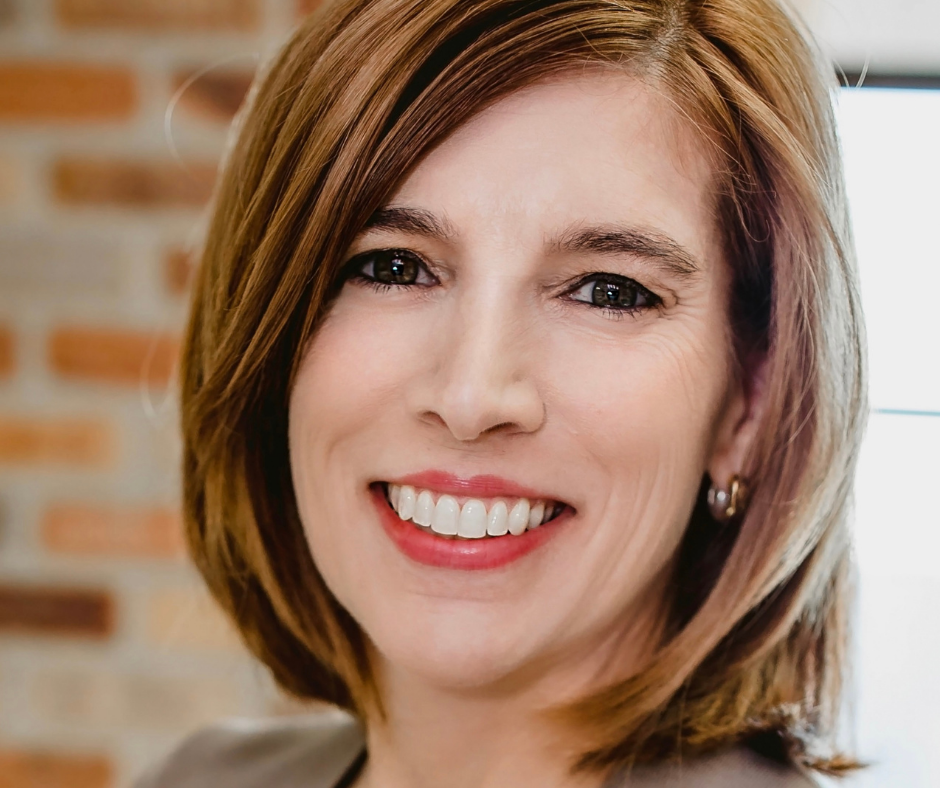
As Waco ISD Board of Trustees president, Tekell works closely with the Waco ISD superintendent to help set the agendas and move the mission and vision of the school district forward.
“I believe my role has a very positive and significant impact,” Tekell said. “In the past, we have suffered from a culture of low expectations. I believe it’s unacceptable and as the president of the board I am in a unique position to push expectations even higher.”
Along with volunteering her time in the school district, Tekell has been involved in St Alban’s Episcopal Church, the Greater Waco Chamber of Commerce, and the Junior League of Waco. Tekell said at one point she was on 10 different boards but has gotten “better at saying no” as she’s gotten older.
Tekell said one of the most influential volunteer opportunities for her was being president of the Junior League. Its mission is to promote women leadership and community service.
“The opportunity to be with other professional women really made a positive impact on my life,” Tekell said. “It influenced a lot of the choices I’ve made.”
Tekell said finding a way to get involved in Waco is important and is not only rewarding but helps build up the community.
“There’s a lot of opportunities to find something you’re really interested in and there’s no better way to meet people,” Tekell said. “I do know it makes living here much more fulfilling when you get to know the people who shape what kind of community we have.”
Whenever she isn’t volunteering or working in her community, Tekell said she most enjoys riding her bicycle in Cameron Park on the mountain bike trails almost every weekend.
“I ride my bike a lot. I have four bikes,” Tekell said. “Lately I’ve been gravel biking up in Clifton. There’s a lot of beautiful country there, a lot of wildlife, no cars. That’s my favorite thing to do.”
After Tekell studied law at Baylor University, she decided to stay in Waco and has now lived here for 37 years. Waco is a very unique place to live, full of friendly and welcoming people, Tekell said.
“My experience at the law school was the most influential,” Tekell said. “I think it does a really good job emphasizing the importance of leadership in the community and public service.”
Tekell said her most memorable experience living in Waco and being on the Waco ISD Board was being invited by former president George W. Bush to mountain bike at his ranch in McLennan County in 2019.
“The first thing he said after greeting me was ‘I just want to thank you for your service to our community,’” Tekell said. “I was very appreciative that he took the time to extend an invitation and then to express his gratitude. If not for living in Waco and serving in that capacity, I would have never gotten that opportunity.”
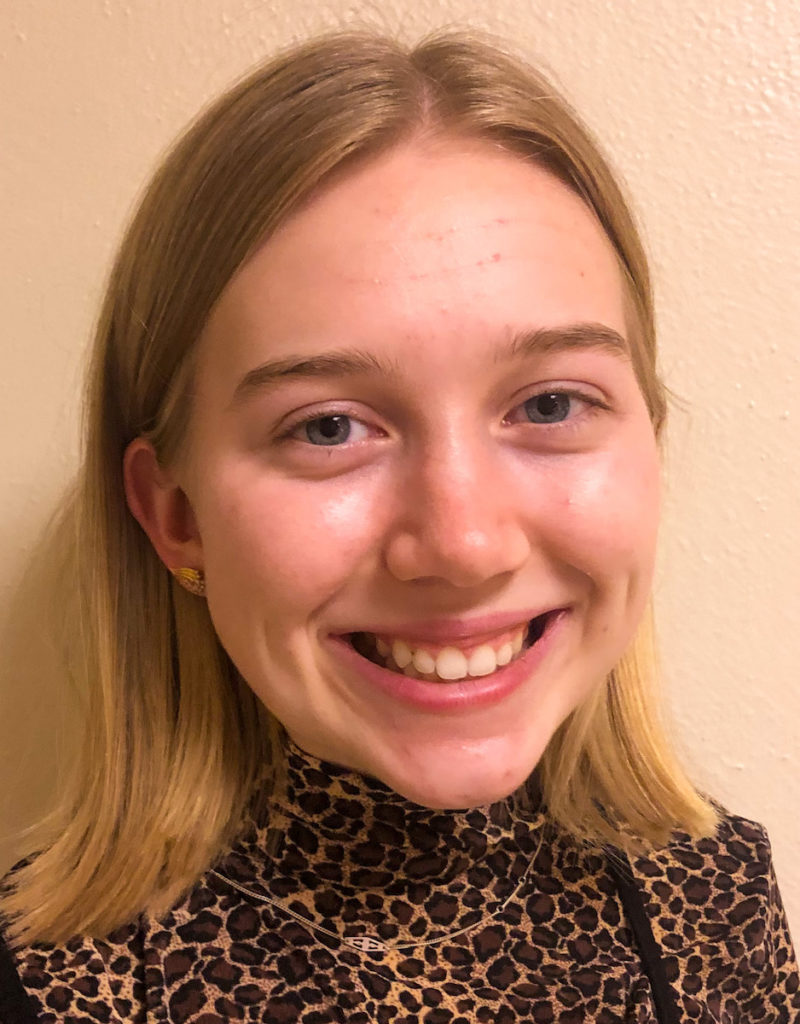
Gabby Sherwood is a freshman journalism major at Baylor University from Austin.
The Act Locally Waco blog publishes posts with a connection to these aspirations for Waco. If you are interested in writing for the Act Locally Waco Blog, please email Ferrell Foster at [email protected].
By Andrea Zimmerman
Tuesday morning, Feb. 16, the winter storm had brought life in Waco to a halt. With our calendars suddenly empty, yet still being a goal-driven parent, I was in the middle of a Marvel Avengers Movie Marathon with our sons when my husband, Aaron, got a call.
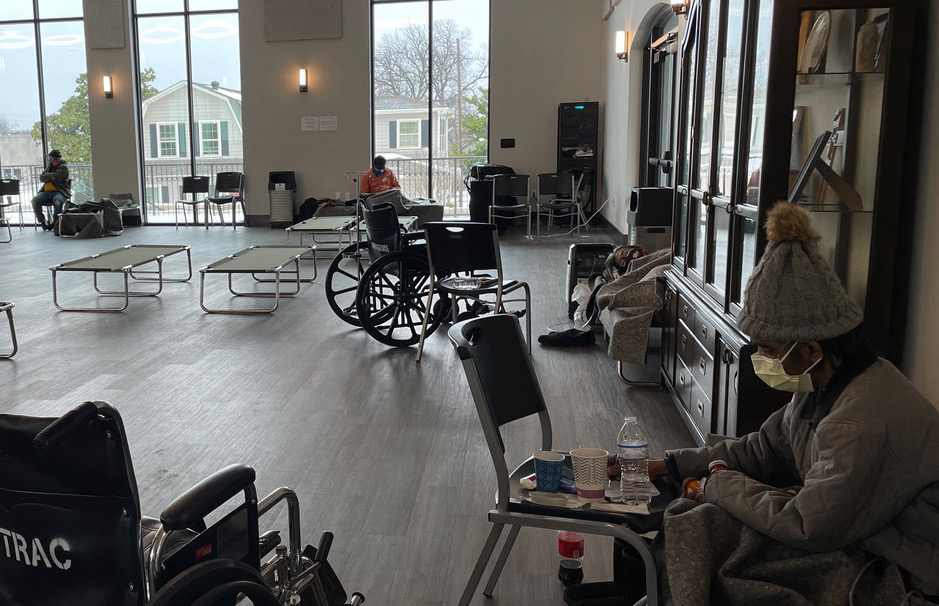
Aaron is rector (senior pastor) of St. Alban’s Episcopal Church. The city was calling to take him up on his offer to open up the church’s new Parish Hall (what some churches call a fellowship hall) as a warming center. We had zero experience with this type of emergency but were glad to put our resources to use for the community. The church still had power and water, and since we live near the church, we could safely get there on foot.
For us, like every other Wacoan, experiencing negative temperatures and an ice/snow/ice sandwich was dumbfounding and surreal. Couple that with the loss of power, heat, and water by so many, it created a real crisis for everyone. This was especially true for the most vulnerable in our community, many of whom depend on electricity for medical devices they need to live.
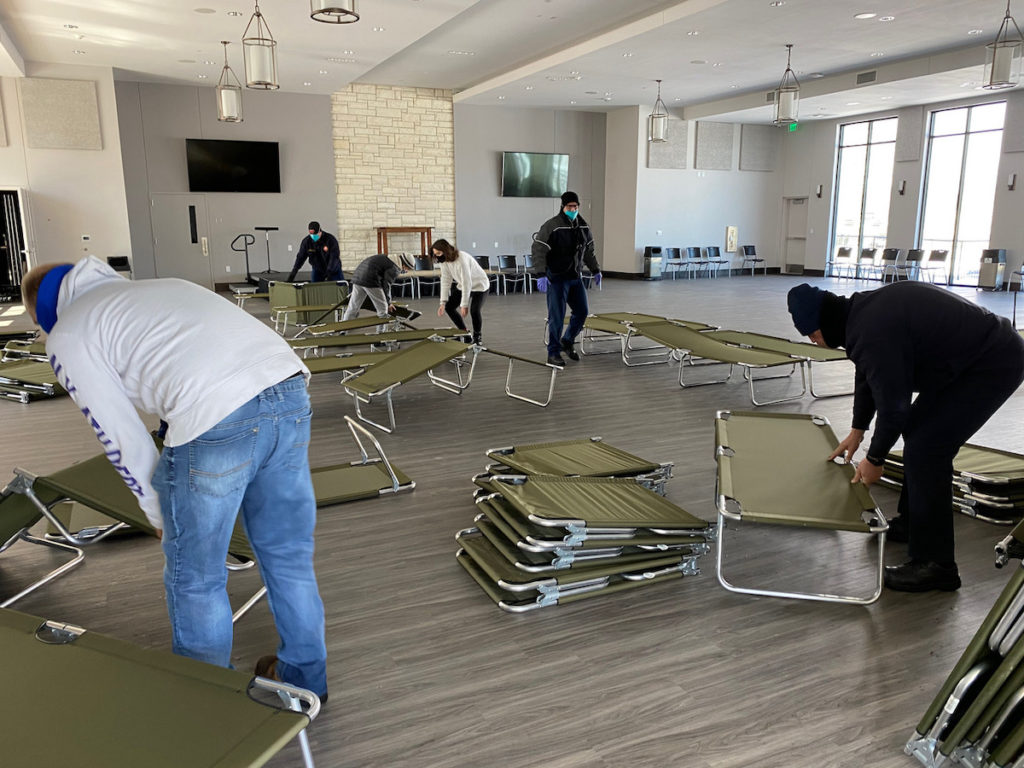
Our family rushed to the church to arrange the space and prepare for the City of Waco to deliver cots and blankets. Our kids shoveled snow with the snow shovels we brought from our years living in Pennsylvania. I started coordinating the whole endeavor.
Our social media (@stalbanswaco) got the word out that the space would be available. Then we started calling people to help; this effort was led by our associate rector, the Rev. Neal McGowan. We knew it would be challenging to find volunteers who could (1) get to the church, and (2) who were vaccinated against or who had active COVID-19 antibodies. We would soon see God provide.
While doing all that, we were hit with the reality that we hadn’t used this space in the church since Shrove Tuesday (aka Fat Tuesday, aka Mardi Gras) 2020. The kitchen was bare. Supplies were minimal. So we had to quickly figure out how to turn snacks from the Youth Room into enough food to feed our anticipated guests.
It was not lost on us that it was in fact Shrove Tuesday 2021, the one-year anniversary of our grand opening of this new, beautiful, 5,000-square-foot space. We had intended to use the space to serve the congregation and community with lectures, seminars, events, and large gatherings, but had shut down due to the pandemic. Now, the space was coming back online, but in a new and surprising way as a warming center.
As we opened our doors and guests arrived, it was clear St. Alban’s was equipped to serve the specific needs of our guests. Our first volunteer, who showed up out of the blue, was Elizabeth “Liz” Ligawa. Aaron had gotten to know Liz, a medical social worker and faith-based community organizer, through working together on the COVID-19 crisis. I was happy for the help, but at first I didn’t think we needed so much expertise. Well, it turns out we did, but I’ll get to that in a minute.
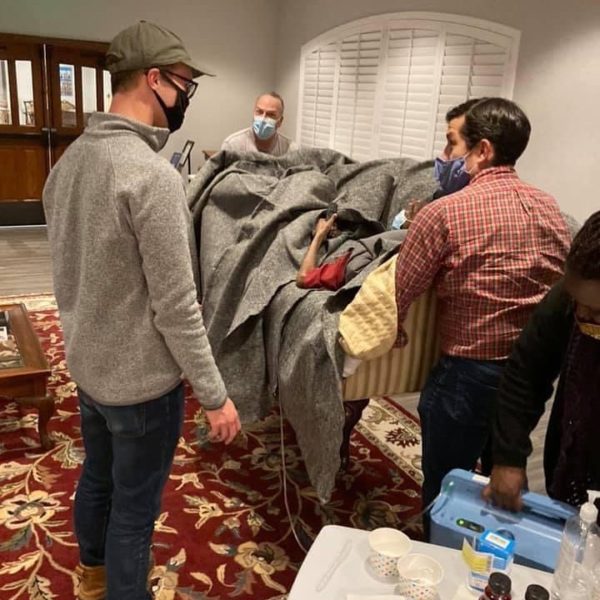
As we began to welcome guests, it became clear that some needed more than just a place to stay warm. For example, one extended family included a mom two days away from giving birth. They needed a way to keep warm while staying isolated and COVID-safe. We were so pleased (and so were they!) to place them in Higgins Parlor, a beautiful “living room” type space named for our founding minister. Here they had a private restroom and could isolate safely.
Many churches, but especially Episcopal churches, concern themselves with feeding their guests. Our congregation’s life consists of pancake suppers, Lenten soup dinners, parish picnics and potlucks, newcomers’ wine-and-cheese parties, and big all-church catered dinners — and of course, that holy meal of bread and wine every Sunday.
For me personally, when I’m hosting an event, I am especially concerned with feeding my guests. So our limited food options at the church presented quite the conundrum for me. Additionally, as a church, we were committed to loving these folks (and volunteers) with hot meals.
Enter Corey McEntyre of Milo All Day and Danielle Young of Revival Eastside Eatery, who both reached out to us to donate prepared food. Between these two angels, we were able to not only serve every guest and volunteer for four days, we were able to send every guest home with food to cover at least a day, maybe two, of meals (remember, power was out and stores were empty at this point). We somehow managed to still have soup left when we closed the center, so our volunteers delivered it to elderly neighbors.
Perhaps the most stunning piece of this experience was the way we were able to serve some guests with unique needs. With power and water out across town, one of our local hospitals could not discharge patients to their power-less homes since they depended on oxygen and required wheelchairs. Not only did we have space available to host them, I knew we could find the right medically-trained volunteers.
Thanks to the many people who said “yes” to our calls — and were brave enough to drive through the tundra — we were able to provide around-the-clock care from a combination of nurses, doctors, and healthcare professionals from our church and community. Thanks to the direction of Liz Ligawa, who was at this point our resident medical social worker, we did full assessments of each guest and were able to connect them with their regular medical services (home health, hospice, family, etc.). We were also able to secure oxygen so they could be transported home. When it became clear that power wouldn’t be restored to one of our guest’s homes for some time, we were able to get this guest into a skilled nursing facility who could meet their needs better than we could.
Thanks to volunteers with four-wheel drive, we were able to send teams to check on the power and water situations at our guests’ homes. (We figured sending our guests to do the checking themselves — “wheelchairs and oxygen on ice” — was a bad idea). This also helped us connect with neighbors and assist them in this crisis.
I can’t end this without telling a couple stories of ways the Waco community stepped up to meet specific needs.
The first story relates to Mr. T, one of our guests, who mentioned to a volunteer that he really liked cereal. We didn’t have any cereal, so this volunteer made it her mission to find some. But she couldn’t find milk because there was no milk in Waco at this point. Well, not even 30 minutes later, the city showed up with a huge donation from Coca-Cola that included a milk drink perfect for cereal. So we sent this now-beloved guest home with milk, cereal, and a bunch of other food to get him situated until he could get to the store.
The next story is about water. We were quickly running out of bottled water and with the looming possibility of a boil order, we were concerned we would not have clean water for our guests. While I was mentally cycling through options, a volunteer texted she was headed to the store and could she pick something up for us? “Water!” I said. She went to Mission Waco’s Jubilee Market, which graciously allowed her to purchase more than the ration. When she went to pay for the water and other supplies, the credit card machine was down and she was short on cash. Jubilee Market gave her a gift card to cover the rest of the supplies. Even with this water from Jubilee, we realized we would need more. At that moment, in walks a parishioner with several cases of water donated by the Robinson Fire Department. Not only did this meet the current needs at the warming center, this allowed us to send water home with every guest.
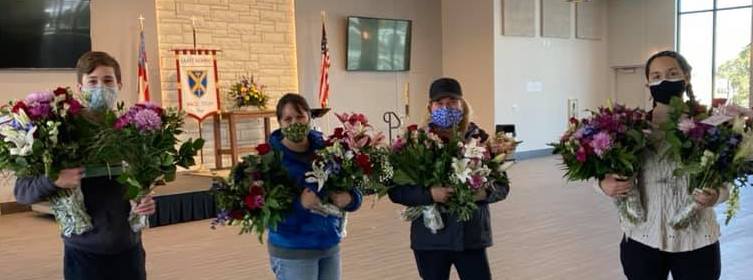
Last story: flowers. Flowers? Yes. We are Episcopalians. We are flower people. We are Easter people. We do the fancy things. And to my surprise, on day two, some of our parishioners arrived with huge crates of beautiful flowers donated by H-E-B (where we usually get our Altar Flowers). They arranged and placed flowers all over the Parish Hall, bathrooms, kitchen, and anywhere with a flat surface. What an expression of God’s lavish love! Also, it helped freshen the air because we are on day “too many” of not having showered due to the water crisis. When the center closed, volunteers wrapped up the bouquets and delivered them to neighbors around the church.
Wacoans, I could go on and on with stories about how your community met the specific needs of your neighbors in this time of crisis, and we were just one of the facilities serving last week. I think we all agree that this unwelcome historic weather event could have been the straw to break our already weary backs. And yes, we are still weary because we are still in multiple crises. But let’s take a break and rejoice in what just happened in our community.
Take heart that some of our most vulnerable residents did not return home to freeze. On the contrary, they had wonderful care including hot drinks and gourmet meals. Not to mention, compassionate care from some of the finest medical professionals in town. Let’s be thankful we have excellent leadership in Waco, leadership that sees the community through such an unprecedented time. Well done, friends. Well done.
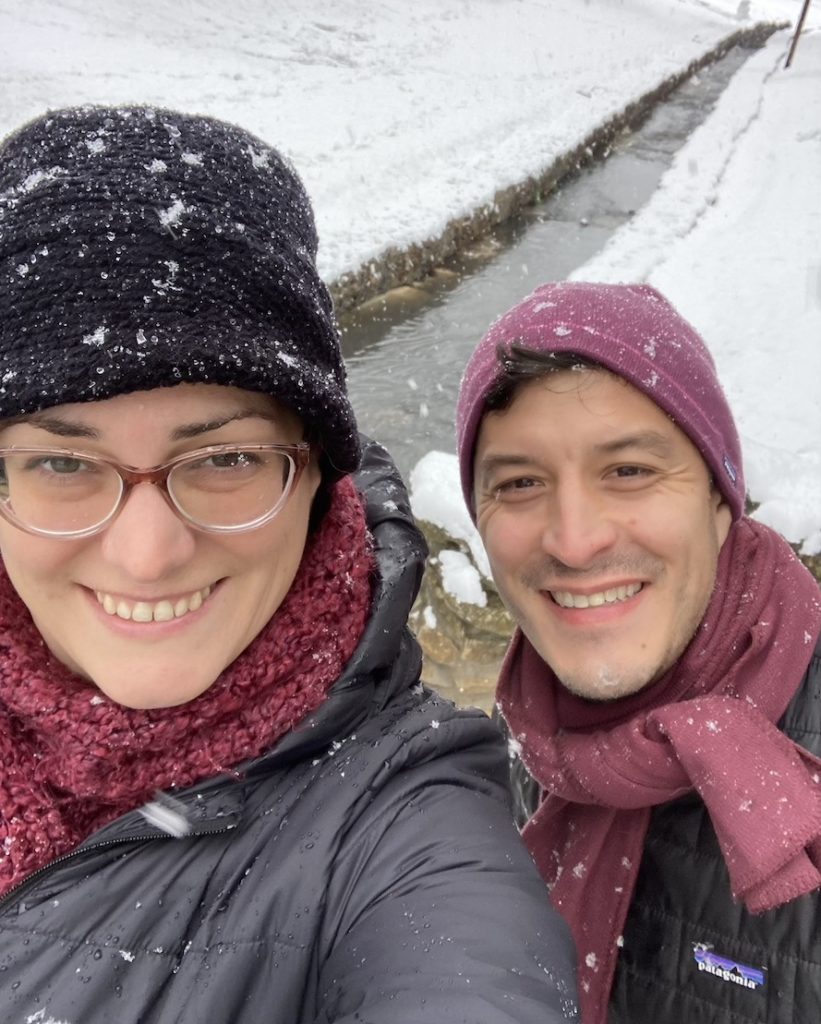
Andrea Zimmerman is a native Michigander, educated in New York City and has lived in Kazakhstan, Boston, Pittsburgh, Houston, and now Waco for nearly eight years. She has worked in the fashion, nonprofit, and churchy arenas. During non-COVID times, she works as a full time 4th & 5th grade tutor focusing on STAAR readiness at Provident Heights Elementary School.
Special thanks to volunteers from St. Alban’s membership and staff:
Sarah Aynesworth
Anna Beaudry
Troy Beaudry
Abel Castro
Stephanie Drum
Emily Edwards
Austin England
Susie Farley
Katherine Goodwin
Johnson Hagood
Vanessa Handy
Kenn Harding
Alan Jones
Stewart Kelly
Tracy Kelly
Michael Larsen
Kara Leslie
Missy Lowder
Neal McGowan
Darren Metting
Holden Miller
Sue Parrigin
Jeff Raimondo
Angela Tekell
Jhonas Theill
Sue Townsend
Meghan Watkins
Christopher Williamson
Andy Wisely
John Wood
Aaron Zimmerman
Abigail Zimmerman
Andrea Zimmerman
Athan Zimmerman
August Zimmerman
Special thanks to Waco/McLennan County Community Members & Organizations:
Michael Attas
Linda Bostwick
Anna Clark-Martinez
Emma Clark-Martinez
Coca-Cola
Elesha Coffman
Lily Coffman
Ryan Dirker, Asst. Emergency Mgt. Coordinator, City of Waco
Amanda Harman
Clint Harp
Kelly Harp
H-E-B Floral Department
M’Lissa Howen
Elizabeth Ligawa, MSW, Central Texas Interfaith
Corey McEntyre, Milo All Day Restaurant
Andy McSwain
Chris McSwain
Lee Pahimeyer
Robinson Fire Dept
Noah Sutton
Waco Fire Department
Waco Transit
Melissa Wray
Danielle and Travis Young, Revival Eastside Eatery
The Act Locally Waco blog publishes posts with a connection to these aspirations for Waco. If you are interested in writing for the Act Locally Waco Blog, please email Ferrell Foster at [email protected].
In honor of Black History Month, we are featuring interviews with local Black community leaders. These pieces were written by Baylor University students from the Department of Journalism, Public Relations, and New Media. The students asked questions about what the leaders love about Waco, and we are excited to share their responses with you this month.
By Lauren Combs
Lakia Scott, assistant professor of curriculum and instruction with Baylor University’s School of Education, pursues research alongside teaching undergraduate and graduate students. She decided to dedicate her research to improve urban literacy.
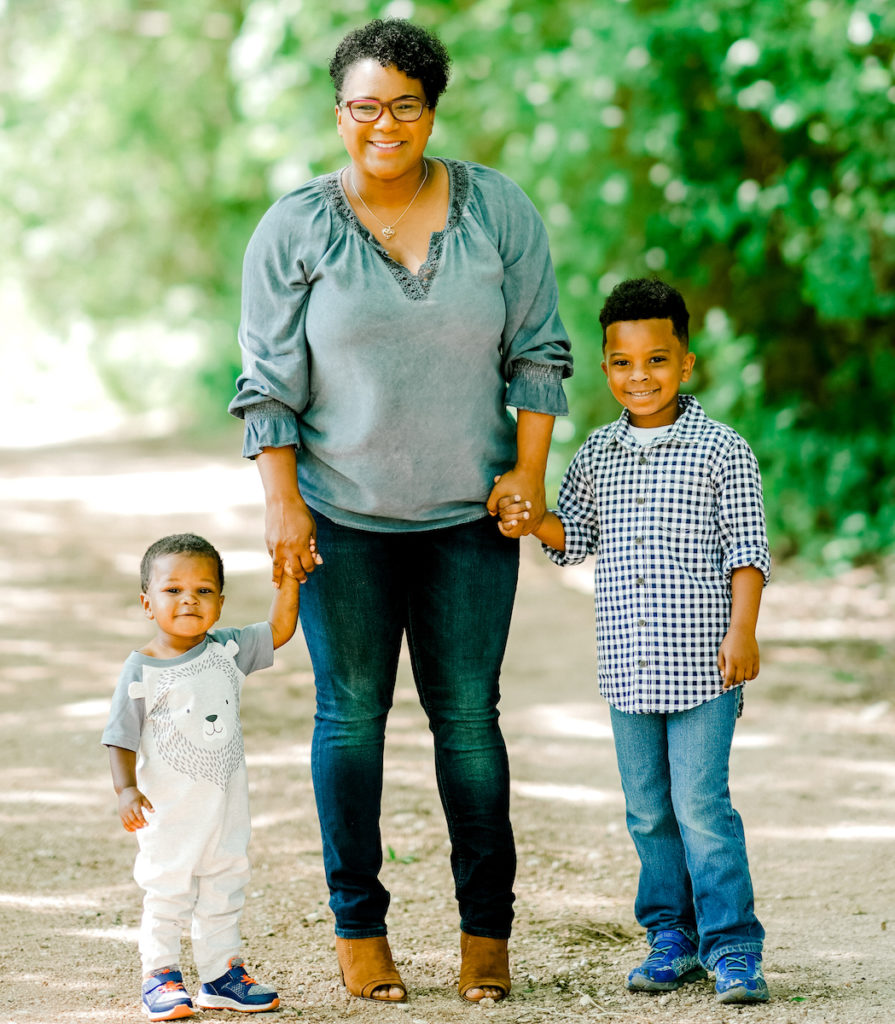
“My research for the last three years has been on the Freedom Schools program,” Scott said, “and that is a summer literacy initiative that is sponsored by the Children’s Defense Fund that helps to lessen summer reading loss.”
Scott said students who don’t have access to resources like summer enrichment programs or tutoring opportunities typically fall six to nine months behind before returning to school in the fall.
“They’re actually returning to school as if they are in the mid-year of their previous academic school year,” Scott said. The program she created and continues in partnership with the CDF model seeks to “reduce that learning loss, that summer reading gap, so that students can go back to school in a better frame of mind academically.”
Scott said the Freedom Schools program uses culturally relevant texts at all levels that are developmentally appropriate to increase students’ exposure to reading. The students have three different opportunities to engage with texts throughout the day.
“They’ve become more fluent readers. They also build comprehension skills because they’re reading things they really, really care about, and that makes all the difference,” Scott said. “Whereas a sixth grader may come to me on a fluent reading level of fourth grade or right under fifth grade, they may leave Freedom Schools in a 30-day time span over the course of two months at a seventh grade level.”
Scott said the students who participate in this program are also positively impacted because they are appreciative of reading, academically motivated, and likely to become leaders in their classrooms and communities.
“I know reading is only one of those core subjects taught,” Scott said, “but reading is seen in every other subject. And so if we don’t equip our students with those foundational literacy skills, it has long-term impacts.”
Waco ISD has a reading proficiency of 30%, which means 30% of the students in the district are reading at or above grade level. “My goal, if I were able to cast this larger vision for the City of Waco, would be to see that reading percentage increase exponentially to the 90 percentage range,” Scott said.
Scott said the community has already been doing a lot to help achieve this goal, but she would like to continue to see community members making their presence known in the schools with opportunities like mentoring programs. She also encourages sororities, fraternities and other service-based organizations to continue being advocates in school settings. However, Scott also said there are other, less direct way to increase the literacy levels.
“Something that I think is really overlooked is attending school board meetings. The presence of community members at school board meetings is powerful because so much happens there— the ways budgets are allocated, the ways resources are allocated— all of those things are talked about and discussed and voted upon at the school board level,” Scott said.
Scott even encouraged community members to run for school board positions and community leadership opportunities.
“If we are really serious about making change in ways that are going to positively affect the students that are in the community,” Scott said, “we need to be more vocal about it.”
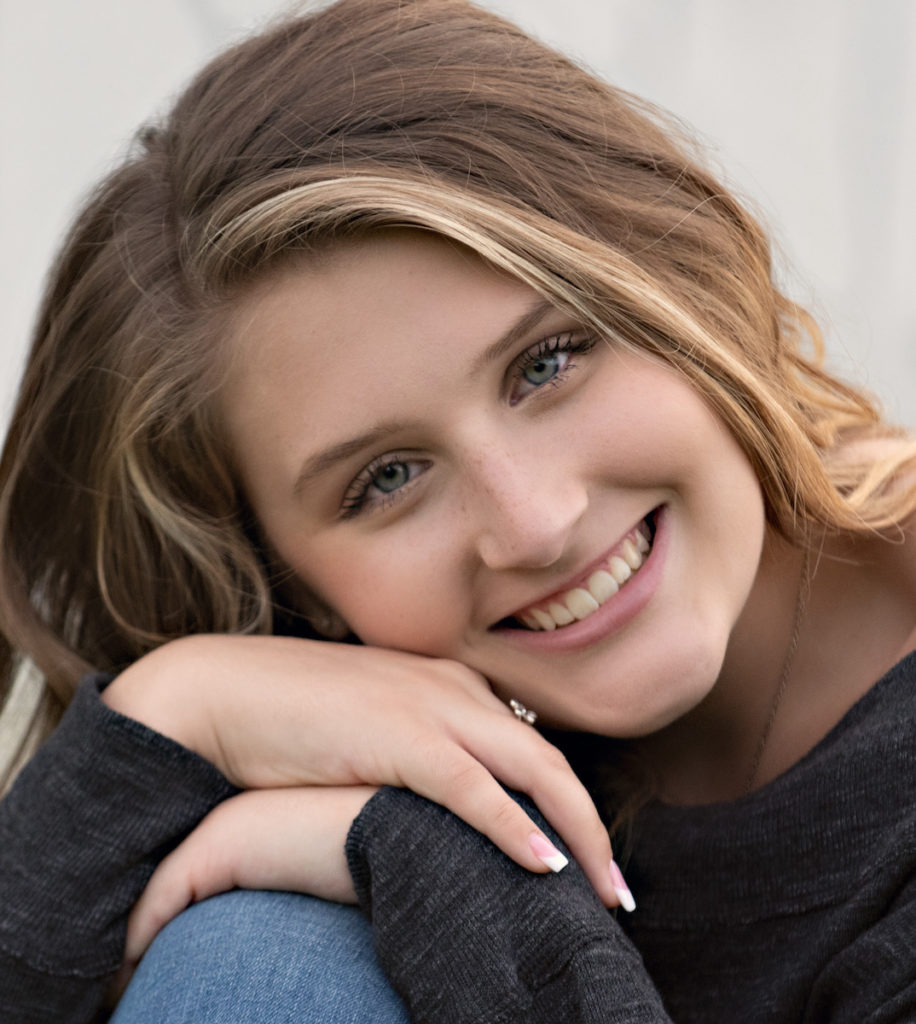
Lauren Combs is a Baylor University sophomore from Virginia majoring in journalism who hopes to pursue magazine writing or public relations for nonprofits or ministries.
The Act Locally Waco blog publishes posts with a connection to these aspirations for Waco. If you are interested in writing for the Act Locally Waco Blog, please email Ferrell Foster at [email protected].
In honor of Black History Month, we are featuring interviews with local Black community leaders. These pieces were written by Baylor University students from the Department of Journalism, Public Relations, and New Media. The students asked questions about what the leaders love about Waco, and we are excited to share their responses with you this month.
By Skylla Mumana
For many new to the area, and even some long-term residents, navigating the city may prove difficult and finding things to do may seem even harder. However, local figures such as 38-year-old Shamica Evans are proving that the city has so much to offer.
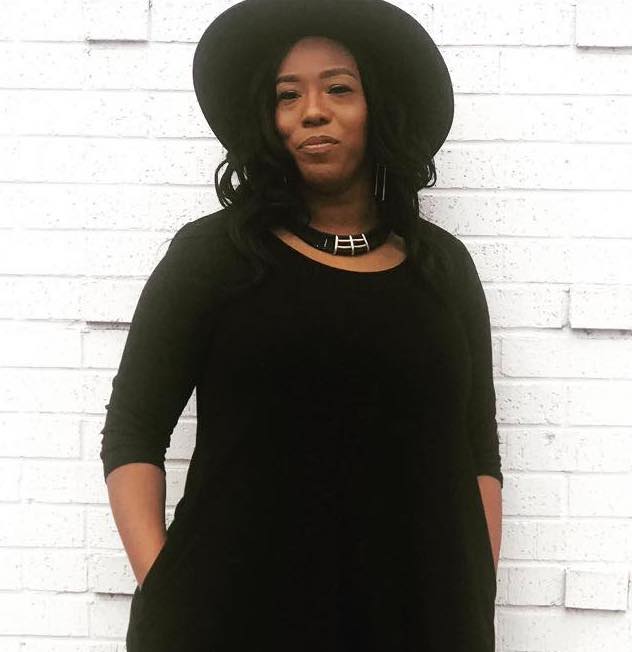
Evans is founder of Waffle Chic, a local food truck. There, she works to deliver classic Southern comfort food for the Waco public to enjoy. Her goal is to create community, which she continuously strives for by serving up fresh, mindful ingredients with a smile. She came up with the idea of her truck from her own personal experiences with single-motherhood.
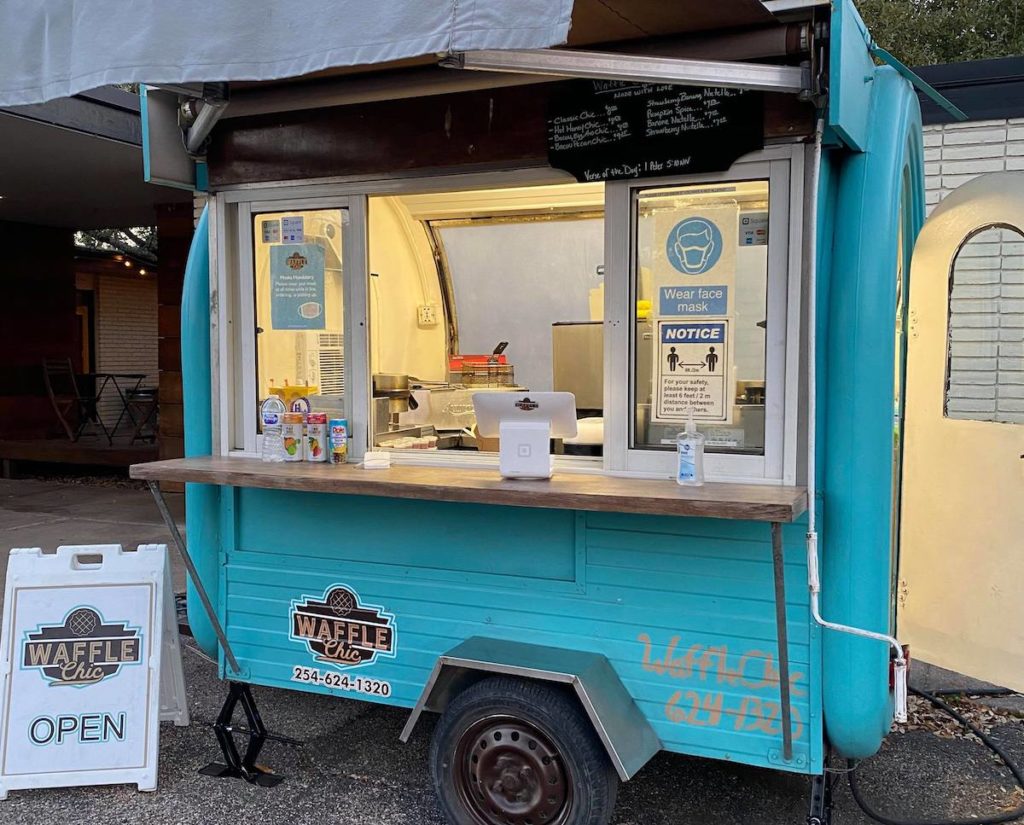
“The name Waffle Chic originates from me being a single-parent with my kids,” she said. “The waffle is kind of like the mom, and the chicken is the chicks, my little chicks.”
By selling chicken and waffles, Evans wanted to bring a fresh, new perspective to the food truck scene in Waco and expose the public to good, Southern cooking on the go. Inclusivity is a staple in her kitchen, and she strives to accommodate the needs of her customers every chance she gets.
“It’s healthier for those that are healthier, it’s still Southern for those that like Southern because I’m still using all the Southern spices. Kids can eat it, and older people can eat it, too,” Evans said.
To Evans, Waco is a booming city that has room for both big and small businesses. She also thinks Waco continuously fosters a wholesome sense of community that rivals small towns. Growth and connection are two factors that help drive the Waco community and lead to what she describes as outstanding community building.
“I don’t feel like we’re in competition. I just feel like we’re all growing with each other,” she said. “We’re a village here in Waco, and we’ve got plenty of giants who are willing to build empires and kingdoms with each other.”
Evans is heavily involved in programs and organizations within the Waco area, such as Cen-Tex African American Chamber of Commerce, Hispanic Chamber of Commerce, and Hewitt Chamber of Commerce. All of these organizations were instrumental in helping Waffle Chic get its start. Not only that, but Evans is also known to actively help out the homeless. Fueled by her faith and background, she hopes to give back to a community that gave so much to her.
“They’re really the ones experiencing hardship,” Evans said. “I just see them as family as well, and still to this day each of them will come to my truck, and they’ll come to just say hello.”
When it comes to describing how special Waco is, Evans had her own acronym to share.
“I could give Waco four words or phrases just by using the letters in its own name,” she said. “Waco is a wonderful, awesome community of outstanding people.”
By connecting food and community, Evans proves that not only does Waco have a variety of eateries to choose from, but it also is a city that is filled with people who inspire and prosper.
“I’ve lived here in Waco my whole life,” Evans said. “I don’t see myself living anywhere else.”
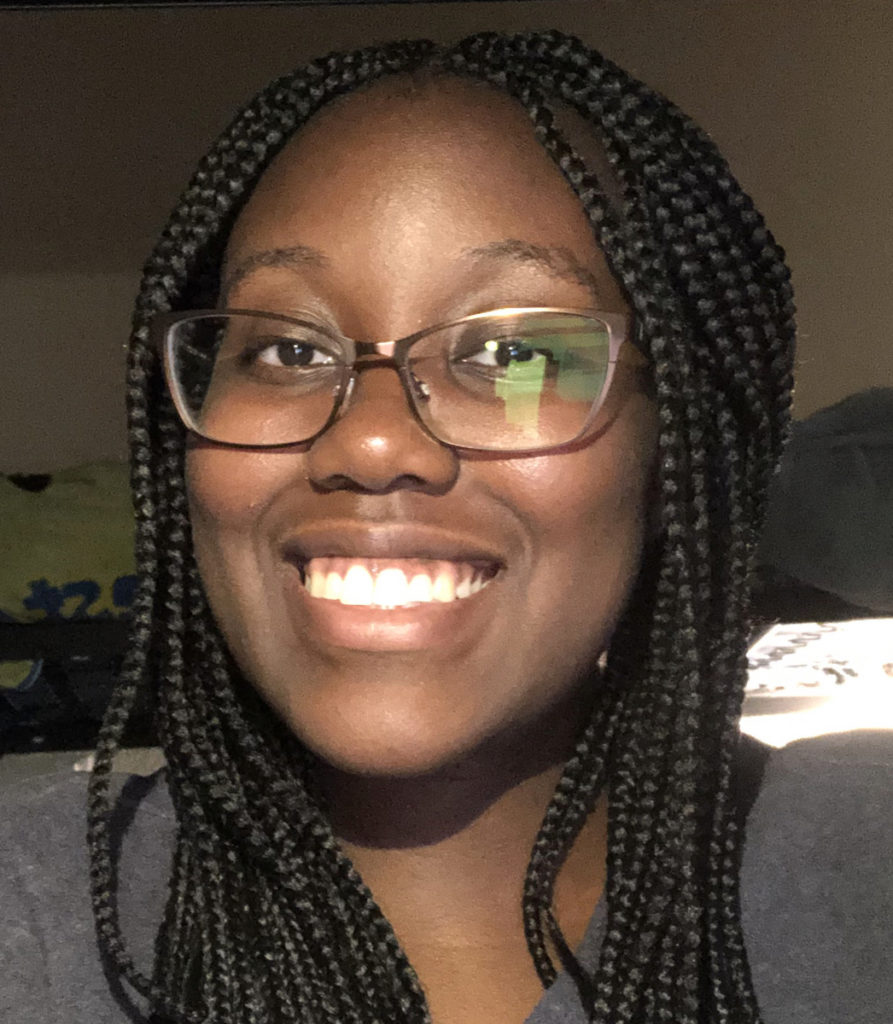
Skylla Mumana is a freshman journalism major at Baylor University from San Antonio.
The Act Locally Waco blog publishes posts with a connection to these aspirations for Waco. If you are interested in writing for the Act Locally Waco Blog, please email Ferrell Foster at [email protected].
In honor of Black History Month, we are featuring interviews with local Black community leaders. These pieces were written by Baylor University students from the Department of Journalism, Public Relations, and New Media. The students asked questions about what the leaders love about Waco, and we are excited to share their responses with you this month.
By Gi’erra Cottingham
Time does not always permit us to book a flight, pack a bag, and travel to experience foods around the world, but sometimes it comes to us. Two community leaders have brought Cambodian food to the heart of Waco. In 2016, Chevy and Mike DuBose introduced The Blasian Asian, an authentic Cambodian cuisine, in Union Hall.

“The menu is 100% Cambodian food,” Mike said. The word Blasian comes from the combination of their race and ethnicity. Mike is Black, and Chevy is Cambodian. “Our baby is a combination of Black and Asian,” DuBose said — Blasian.
“Mrs. DuBose and I lived in Seattle for about 20 years where I was an aeronautical engineer, and she did aerospace repair. I accepted a job promotion in Waco, but when we got here, she was really craving Cambodian food,” Mike said. “Eventually, she started cooking for me. I’d share the food with my staff, and they highly encouraged her to invest in a food truck. Our business took off from there. We’ve now migrated from the food trailer of three years to a restaurant in Union Hall that we began in March” last year.
The couple’s determination to fulfill their mission in sharing what they love with the Waco community is appreciated among local Waconians. The Blasian Asian was voted “Best Food Truck 2019” and “Best Asian Food 2020.”
“My personal favorite dish is the garlic fried rice. There are two popular dishes on our menu: the garlic fried rice and the Blasian itself,” Mike said. “The Blasian has a large variety that includes chicken, beef, pork, noodles, and egg rolls, while the garlic fried rice has been voted the best in Waco. Most customers have commented that they were obligated to use soy sauce at other restaurants to increase the flavor and didn’t need it for ours.”
Due to the couple’s community involvement and leadership duties, Chevy’s availability to consistently cook in the kitchen is slim. She oversees the quality of the food as she’s the only one who knows each Cambodian dish intimately, but most of her time is spent preparing and making sure the food meets her expectations, while The Blasian Asian’s employees are trained to cook and present the dishes.
“Since we moved to Waco, my wife and I have been a part of community tasks. We are active members of the NAACP Waco chapter where we participate in meetings, functions, and events. We are also members of the African American Chamber of Commerce and the Hispanic Chamber of Commerce,” Mike said.
The Blasian Asian’s owners have persevered during COVID-19 and are hopeful that other small businesses do the same. The couple began their dream from simply sharing Cambodian food with friends and has made it thus far despite setbacks.
“The advice I would give to small businesses during the COVID-19 pandemic is to keep on. This is temporary,” Mike said. “We have a lot of support from the community during this time, but the most important thing to remember is to not give up and find ways to reduce costs without shutting down.”

Gi’erra Cottingham is a freshman at Baylor University, majoring in broadcast journalism. She was born and raised in Houston where she attended Carnegie Vanguard High School. Her hobbies include being outdoors, spending time with family, and writing.
The Act Locally Waco blog publishes posts with a connection to these aspirations for Waco. If you are interested in writing for the Act Locally Waco Blog, please email Ferrell Foster at [email protected].
By Kim Patterson
When I was a kid, my favorite board game was Clue. Something about being transported inside an imaginary mansion to solve a murder mystery awakened my inner detective, and I loved assuming a serious poker face as I deduced “whodunit.”

If you, too, enjoy the fun of solving a mystery, join us for “Clue: The Musical” Hearts in the Arts Gala sponsored by McLennan Community College. This year, due to recent weather disruptions, the event has been rescheduled for 7:30 p.m., Thursday, March 4, at the MCC Ball Performing Arts Center.
Now in its 19th year, the Hearts in the Arts Gala has become a community favorite with its blend of dining and a musical performed by McLennan Theatre students. This year’s production provides loads of inspiration for patrons who enjoy dressing to the theme of the show, and Professor Plum and Miss Scarlet are already on the guest list.
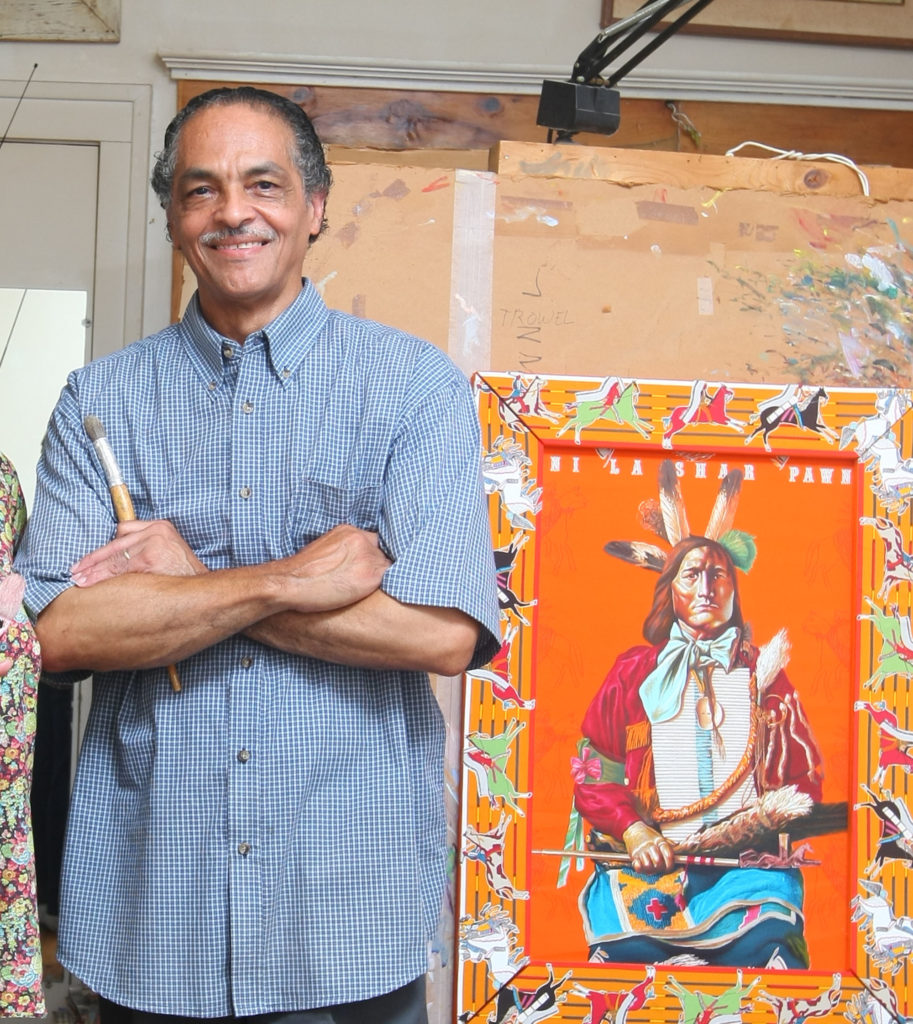
(photo courtesy of Waco Tribune-Herald)
Adding to the fun, and also extended one week, are ticket sales for a chance to win one of two Hermès scarves designed and autographed by internationally renowned Waco artist Kermit Oliver. Oliver is the only American artist ever commissioned for the exclusive Hermès Paris fashion house. Generous supporters of McLennan Arts donated the scarves and acquired the autographs on Oliver’s highly sought-after Kachinas and Pawnee designs. An Hermès scarf bearing Oliver’s unique artwork and signature is exceptionally rare and virtually priceless.

Tickets for the Scarf in the Arts raffle are $20 each or six for $100 and are available online until 11:59 p.m., March 3 at www.mclennan.edu/foundation/scarfinthearts. Tickets may be purchased in person at the March 4 Gala until intermission when the winning tickets will be drawn. Winner need not be present to win.
“Clue: The Musical” opened off Broadway in 1997 to mixed reviews, but the clever show has experienced a renaissance in community theatre in years since. The musical offers an interactive feature in which audience members help determine which of the show’s colorful characters killed Mr. Boddy, what weapon they used and in which room of Boddy Mansion the murder took place. Based on the cards drawn, there are 216 possible endings to the show — a feature that will challenge the acting chops of the cast. The McLennan production will be directed by theatre faculty choreographer Joe Taylor.
In-person tickets for the Gala are sold out, but virtual guests may view a live stream of the production at a secure link. Tickets are $100 each and include a generous voucher for dining at Di Campli’s Italian Ristorante in lieu of the usual cocktail dinner.
Hearts in the Arts is an affinity group of the MCC Foundation that supports the arts at McLennan, and event and raffle proceeds benefit scholarships for area students. Gala reservations are due by Thursday, Feb. 25. To make reservations, or to inquire about the Scarf in the Arts raffle, contact the McLennan Community College Foundation at 254-299-8604 or [email protected].
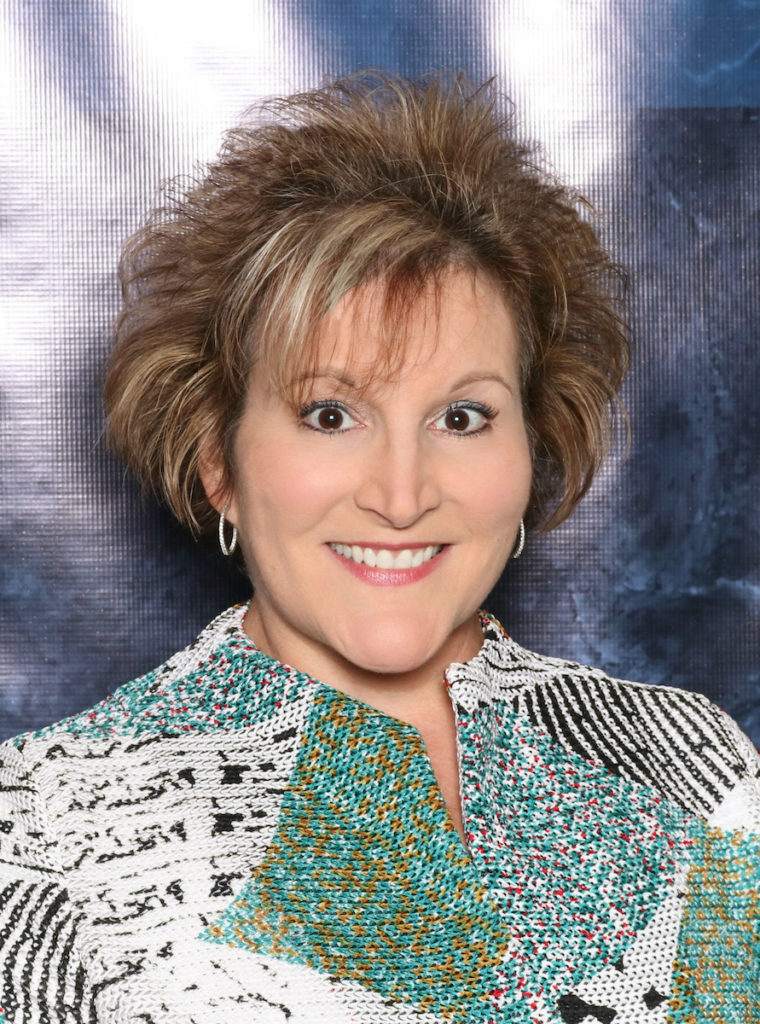
Kim Patterson is executive director of McLennan Community College Foundation and the Office of Institutional Advancement. Patterson is a graduate of Baylor University with degrees in journalism and marketing. In 2017, she earned a master’s degree in management and leadership from Tarleton State University. She and her husband Frank have two grown children and enjoy camping, fishing, and hiking.
The Act Locally Waco blog publishes posts with a connection to these aspirations for Waco. If you are interested in writing for the Act Locally Waco Blog, please email Ferrell Foster at [email protected].
By Rev. Susan Finck
Because I come from a family of lawyers and almost became one myself, I am usually drawn to all things legal. But I must confess, when I received a little white card in the mail summoning me for jury duty, I was contemplating how I might avoid serving. How could I have enough time for sermon preparation? What about my other responsibilities? What if I got “stuck” on a horrible, violent case? I knew it was part of my responsibility of being a citizen, so I headed downtown, wrestling with my inner objections.

I was chosen first for the larger panel, and my interest and curiosity turned to concern as we were seated. I noticed the racial disparity in the room. The defendant was the only AfricanAmerican. Perhaps two of the 50 or so potential jurors might have been Hispanic or people of color. Everyone else was white: the attorneys, the judge — even the bailiff. (The room did not reflect our county: 55% white, 27% Hispanic, 15% Black.) “How does he feel?” I wondered, as I looked at the defendant.
My mind flashed back to all I had read about Waco’s troubled racial history, and the racial history in this country. From slavery, to reconstruction, then Jim Crow. The segregation that had been entrenched in our own community, that my older church members recall vividly. The phenomenon of mass incarceration throughout our country. “Will he be able to truly get a fair trial?” I wondered, as I looked at his court-appointed attorney. I know they are frequently overloaded with cases and often can’t provide the same high quality defense that money can buy.
Then I was chosen for what became an all-white jury of 12. It was the defendant’s fourth DUI, and he was arrested after swerving markedly while driving (without a license) and testing substantially over the legal blood alcohol limit. The prosecutor presented a video where we saw the car swerving, and we heard the officer’s respectful, appropriate interaction with the defendant. We saw documentation of the defendant’s blood alcohol level. Sadly, I voted for a guilty verdict.
After being seated in the courtroom once again, we heard information we had to consider when issuing the “punishment.” Here is where I agonized. The prosecution was recommending a sentence that could put him in prison the rest of his life, since he was an older man. I asked if there was a way that we could sentence the defendant to mandatory confinement in a rehab facility or other location where he could receive the medical/psychological intervention we all felt he needed. I asked about alternatives: programs to help him, rehabilitation. He had been sentenced to those before and had done well while in prison. The problem was when he would get out of prison, “family members couldn’t keep him from behind a wheel.”
It took us several hours to deliberate the “punishment phase.” Most of the jurors were ready to hand down the recommended sentence. I was overcome with the weightiness of our task. We would be responsible for sending a man away from his family and depriving him of his freedom. We also had a duty to protect society. There wasn’t a good solution. It was sad and hard — made harder by the racial dynamic.
“I need for us to ask ourselves the question,” I said. “If he was white, would we be taking this same course of action?” I got a mix of responses, all from the perspective of “color doesn’t matter.” One of the other jurors confronted me: “If he goes free, and you pick up the Trib and read where he kills a child, how are you going to feel?” Obviously we are weighing odds and probability. I changed my vote.
We were escorted back into the courtroom. His family filled two rows of the gallery, the only African-Americans present. I was praying as I looked around. Then, one of the older women caught my eye. It was like she read my thoughts, overhearing my prayer. For an extended moment, we were connected.
I’m not usually a cry-er. As much as I tried to fight it, and as much as I was embarrassed, I cried in the jury box that day. I cried for the family. I cried for the defendant. I cried for our history in Waco; and for “the system.” I cried from the weight of the decisions I had to participate in.
I came away from that experience with a deepening of a conviction that we need more attorneys in our county who are people of color. And jurors, especially jurors. Jury service pulled me out of my own self-focus and broadened my perspective, making me more passionate about the justice I say I believe in. I found many of my beliefs and biases challenged; I had to choose between a list of heartbreaking options. How “severe” was what he had done? How do we equate that with a number of years of someone’s life?
How did depriving him of his freedom balance with protecting society or even his own life?
If you get the little white card in the mail, I want to encourage you to think beyond how you might be inconvenienced. Jury service will cost your time and your mental and intellectual energy. You will have to find others to cover work and home responsibilities. Things will go undone. But it takes all of us to make our society work and work fairly.
The little white card may be your invitation to be faithful to your values or your God, if you are a person of faith. Instead of, “Oh, no, how can I get out of this?” What if you thought: “If I am called, I will willingly serve to do my part to witness for truth and justice. My voice, in dialogue with those of my fellow community members, is needed.”
Besides serving if you are called, I want to invite you to think of any Hispanic or Black young adults you know who might make good lawyers. Ask them if they’ve considered this path. Tell them you can see them in this role. Encourage. Plant that seed.
Finally, join Waco NAACP Black History Month Criminal Justice Series (on Zoom):
“Who Let George Zimmerman Go?: How Being a Juror Serves Justice,” 6:30-8 p.m., Feb. 22, free. One juror could have prevented George Zimmerman, the man who killed Trayvon Martin, from being acquitted. Yet, African Americans are routinely prevented from serving on jurors. Worse, many African Americans actively work to avoid jury duty. William Snowden, founder of The Juror Project, aims to eliminate both these problems.
“Breonna Taylor Could Have Gotten Justice: The Power of Grand Juries,” Feb. 28, 6:30-8 p.m., free. Had the members of the grand jury who heard the Breonna Taylor case known the power they had to call witnesses or issue subpoenas, the outcome might have been different. Award winning, board-certified Criminal Defense attorney Tyrone Moncriffe, explains the grand jury procedure, the power that jurors have, and why it is crucial that African Americans serve on them.
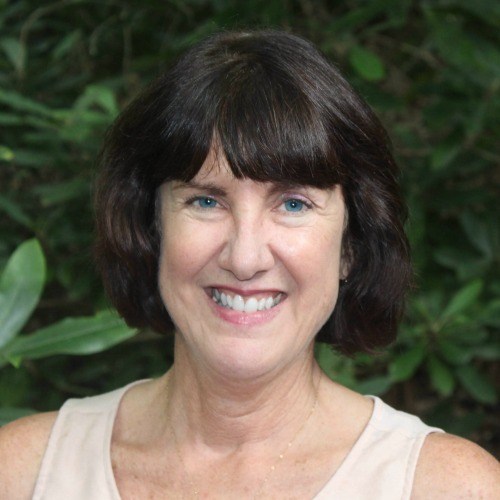
Rev. Susan Finck serves as the pastor of El Calvario Presbyterian Church in North Waco and a board member for Greater Waco Legal Services. She is passionate about literacy and education in our city, and encouraging opportunity for everyone to fulfill their callings. She and her husband, Dr. Bill Lockhart, a long-time instructor at McLennan Community College, have lived in Waco since 2001. They have four adult children and two grandchildren.
The Act Locally Waco blog publishes posts with a connection to these aspirations for Waco. If you are interested in writing for the Act Locally Waco Blog, please email Ferrell Foster at [email protected].
